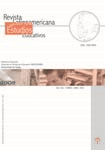Authors
Abstract
This article makes reference to the different dimensions that human beings exhibit in their role as an educable subject. It also deals with the need for thorough understanding of human integrity in order to experience a holistic effective education. This reflection is based upon some theories on the relationship between intelligence and feelings, which should be considered as basic constitutive elements of the learning experience. Some ideas on the complexity of human beings regarding their relationship with reality are gathered and discussed. The concept of “sentient intelligence” proposed by Xavier Zubiri who ponders on the possibility of the intellection of feelings (the senses are intelligent and intelligence is sentient) is specially considered. Simultaneously, other experiences related to the aesthetic dimension, which recognizes beauty as the unifying principle of being, are implemented. All this process is carried out in order to, somehow, highlight the route of knowledge that enters the mind through the senses (experience), goes through the logos and ends in reason to finally find the way, by means of reflection and critique, towards the growth of the spirit used to rescue the individual’s humanity.
References
Boff, L. (2001). Ética planetaria desde el gran Sur. Madrid: Editorial Trotta. Sogasta.
Corripio, Fernando. (1979). Diccionario etimológico general de la Lengua Castellana. Madrid: Editorial Bruguera S.A.
Gracia, D. (1986). Voluntad de Verdad. Para leer a Zubiri. Barcelona: Editorial Valor S.A.
González Ochoa, F. (1998). Pensamientos de un Viejo. Santafé de Bogotá: Grupo Editorial Norma.
Goleman, Daniel. (1996). La Inteligencia Emocional. Santafé de Bogotá DC: Javier Vergara Editor.
Infante, G. (2004). Autobiografía pedagógica. Concurso de Narrativa Pedagógica. Universidad de Caldas –Departamento de Estudios Educativos; ACAL. Manizales.
Le Presbytre, Jean.(1983). Au Large (Meditation pour Etudiants). Paris: Casterman S.A.
Niño M., F. (2008, Mayo). Módulo: Antropología Pedagógica. Hacia una pedagogía de la Inteligencia; (capítulo 3). Bogotá D.C.
Parra Meza, I. S. (2004). Los modernos alquimistas: Epistemología corporativa y gestión del conocimiento. Medellín: Fondo Editorial Universidad EAFIT.
Zubiri, Xavier. (1980). Inteligencia Sentiente. Madrid: Alianza Editorial.
________. (1982). Inteligencia y Logos. Madrid: Alianza Editorial.
________. (1983). Inteligencia y Razón. Madrid: Alianza Editorial.
Zuleta, E. (1985, Junio). “La Educación, un campo de combate”. Revista Educación y Cultura, No. 4. FECODE.

 PDF (Español)
PDF (Español)
 FLIP
FLIP



















